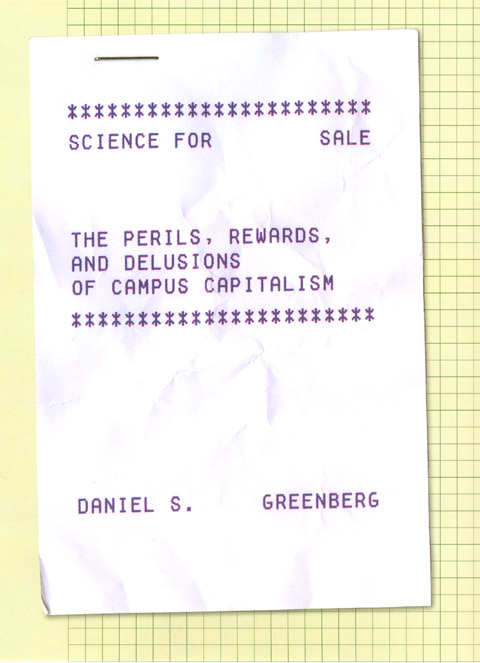Science and money
 An interesting review of Daniel S. Greenberg’s Science for Sale: The Perils, Rewards, and Delusions of Campus Capitalism is currently running in the January-February issue of the American Scientist. Reviewer Robert L. Geiger praises Greenberg’s book for its lucid and balanced look at the influence of corporate funding on American academic institutions:
An interesting review of Daniel S. Greenberg’s Science for Sale: The Perils, Rewards, and Delusions of Campus Capitalism is currently running in the January-February issue of the American Scientist. Reviewer Robert L. Geiger praises Greenberg’s book for its lucid and balanced look at the influence of corporate funding on American academic institutions:
[In] Science for Sale, [Greenberg] ventures outside the Beltway to scrutinize the state of academic science and its supposed burgeoning ties with the corporate world. Although the somewhat fraught title would seem to place this work with an abundance of books condemning university ties with industry, Greenberg has provided a more nuanced analysis and offers some different conclusions.…
He begins with an iconoclastic portrayal of corporate-sponsored research. Far from dominating or corrupting universities, it has been a marginal and (since 2000) shrinking portion of the research they conduct. Academic research has great value for industry, but companies prefer to let the government pay for it. “Not many corporations are besieging universities to take their money,” Greenberg says. “Eagerness for even more business is strongest on the university side of the relationship.” Moreover, he sees little scope for industry to take advantage of this hunger: “In the current era of heightened sensitivity to abuse of academic integrity, the risk of public opprobrium for offending accepted values is substantial.” Given the predominance Greenberg ascribes to self-interested behavior, it is not surprising that he frequently alludes to the fear of institutional embarrassment or individual ruin as the force driving ethical behavior. However, when he returns to this theme in his conclusion, he emphasizes the growing effectiveness of the systems now in place to police and punish scientific misconduct.
The review concludes:
Overall… Greenberg has provided an important assessment of the state of academic science. He finds that public doubts about the integrity of the research enterprise are probably overdone: “Science is in good shape, productive and socially beneficial,” he says. “The negative elements,” he believes, “pose a more complicated, less measurable story.” But Greenberg’s account makes it clear that those negative elements are concentrated in the biomedical borderlands, where vigilance in the enforcement of ethical standards is indeed called for.
Read the full review on the American Scientist website.